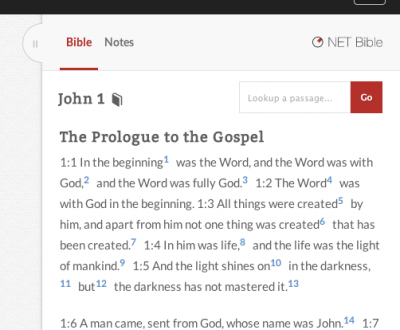Sheol in the NET Bible
Because of the recent brouhaha over Rob Bell’s new book, Love Wins, we all have the chance to think more carefully about how we understand key biblical texts on heaven and hell. See, for example, my colleague Darrell Bock’s recent posts on this point. Much of this discussion centers upon key terms for hell in both the Old and New Testaments. To be sure there are many other angles which we can use to discuss this problem, but the discussion has to start here. And in a real sense, how these terms are translated is important because the Church at large will use the available translations to think about these issues. So this recent discussion made me want to look at how the NET Bible translates some of the key terms which are up for discussion, namely, the Hebrew word sheol and the Greek words hades and gehenna. For this post I took a look at the Hebrew term in the NET Bible, and to be honest I was surprised at what I found.
Because of the recent brouhaha over Rob Bell’s new book, Love Wins, we all have the chance to think more carefully about how we understand key biblical texts on heaven and hell. See, for example, my colleague Darrell Bock’s recent posts on this point. Much of this discussion centers upon key terms for hell in both the Old and New Testaments. To be sure there are many other angles which we can use to discuss this problem, but the discussion has to start here. And in a real sense, how these terms are translated is important because the Church at large will use the available translations to think about these issues. So this recent discussion made me want to look at how the NET Bible translates some of the key terms which are up for discussion, namely, the Hebrew word sheol and the Greek words hades and gehenna. For this post I took a look at the Hebrew term in the NET Bible, and to be honest I was surprised at what I found.
The word sheol (שְׁאוֹל) occurs 65 times in the Old Testament. These occurrences show up throughout the different sections and genres of the Hebrew Bible. Of the books that contain the term, the book of Psalms uses it the most (16 times), while Deuteronomy, 1 Samuel, 2 Samuel, Amos, Jonah, Habakkuk, Song of Solomon, and Ecclesiastes each use it once. The term itself can mean a different things, one of which is hard to put into words:
grave, that is, the place where dead bodies go, without reference to status of the spirit or soul;
death, that is, the cessation or end of life;
or the abode of the dead, that is, the place separate from this earth or this life where sentient beings dwell after their death.
Given the translation philosophy of the NET Bible, I had expected that most all of the occurrences would be either “grave” or “death,” with a note explaining the meaning of sheol in some way. Instead, these are the translations I found:
Sheol – 40 times
grave – 15 times
death – 5 times. In two other places (1 Kings 2:6, 9) the translation “death” is used, but the structure of the translation is dynamic enough that it’s difficult to say that we actually translated the term sheol with the word “death.”
pit – 1 time
netherworld – 1 time
underworld – 1 time
What surprised me is the majority of times we simply transliterated the word. Very often there is a note which explains the meaning of the term, like this one from Numbers 16:30, where the word “grave” is used in the translation:
tn The word “Sheol” in the Bible can be used four different ways: the grave, the realm of the departed [wicked] spirits or Hell, death in general, or a place of extreme danger (one that will lead to the grave if God does not intervene). The usage here is certainly the first, and very likely the second as well. A translation of “pit” would not be inappropriate. Since they will go down there alive, it is likely that they will sense the deprivation and the separation from the land above. See H. W. Robinson, Inspiration and Revelation in the Old Testament; N. J. Tromp, Primitive Conceptions of Death and the Netherworld in the Old Testament (BibOr 21), 21–23; and A. Heidel, The Gilgamesh Epic, especially ch. 3.
In 2 Samuel 22:6, where we use the word “Sheol” in the translation, we have this note:
tn “Sheol,” personified here as David’s enemy, is the underworld, place of the dead in primitive Hebrew cosmology.
So along the way we offer some explanation and clarification of what the terms means. But still I would venture to say that the average reader of an English Bible would not understand much when the word Sheol is used in the text, unless there were substantial notes to explain it. This is not to say that we have translated the term incorrectly. “Sheol” as a translation for sheol is a defensible translation, especially in poetic texts like Hosea 13:14, where Sheol and death are used in parallel:
Will I deliver them from the power of Sheol? No, I will not!
Will I redeem them from death? No, I will not!
O Death, bring on your plagues!
O Sheol, bring on your destruction!
My eyes will not show any compassion!
English is hampered here because it does not many words that would serve as good synonyms like sheol and mavet (“death”) in Hebrew. So a transliteration of a Hebrew term that many readers are likely to know could be a useful solution.
But when it comes to broad theological debates, like the one Bell has sparked with his book, our goal is that the NET Bible be a useful tool which helps guide people into an accurate biblical understanding of the issues involved. We are part of the way there with our explanatory notes, but we could do better and improve our translation in verses where the word Sheol is presently used in the text.


3 Comments
LeFever
Word Trouble
I think, if you will take a look around at other modern Bible translations, you will find the others tripping all over proper translation and usage of these three, sheol being the most common problem. The NET Bible is no special offender here.
Although I agree the discussion must start somewhere, the translation of these words is hardly the issue. In Bell's book it's everything else.
Michael H. Burer
I certainly agree with you.
I certainly agree with you. My hunch, and that is all it is since I have not read his book, is that Bell has arrived at his conclusions for reasons other than word definition and use. It just prompted my own thinking on the matter. Solid, accurate theology must be built on solid, accurate exegesis, of which words are a crucial component, and we want the NET Bible to be a help in this regard, not a hindrance. Sheol is a tough translation problem, that's for sure, and I think we have some room to improve.
ekerwin
SHEOL IN THE NET BIBLE
Thank you for this post. I am in agreement with you when you said in your response, "It just prompted my own thinking on the matter. Solid, accurate theology must be built on solid, accurate exegesis, of which words are a crucial component".
An accurate understanding of the meanings of words in their immediate and their broader contexts is most important. After all aren't most, if not all, cults and false teachings centered around inaccurate exegesis'. They use the same words but have attached different meanings to them.
Keep up the good work you are doing. You are helping to build up the body of Christ.
Lord, continue to bless Michael in his own pursuit of knowing You. Allow him to continue to grow in the grace and knowledge of our Lord Jesus Christ.